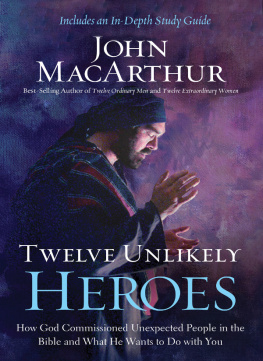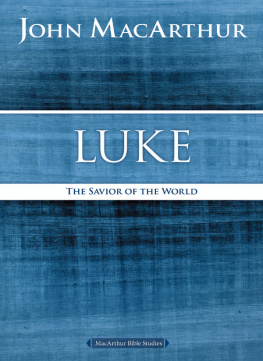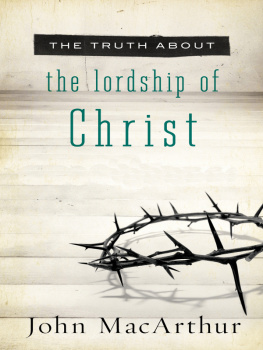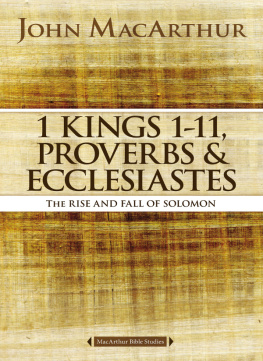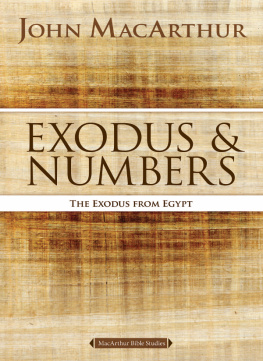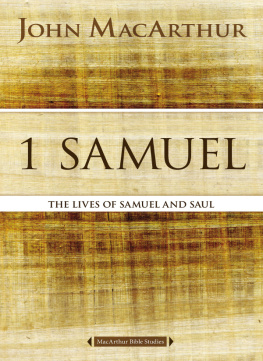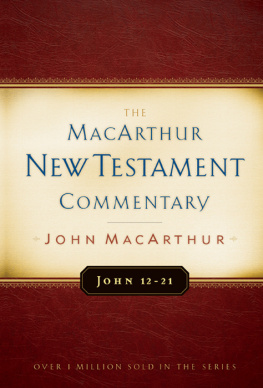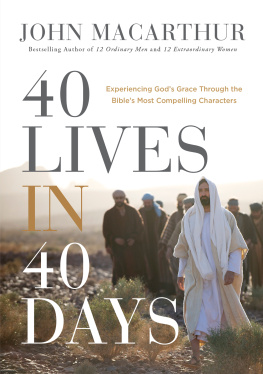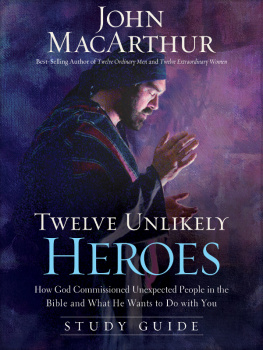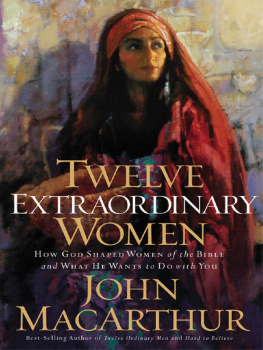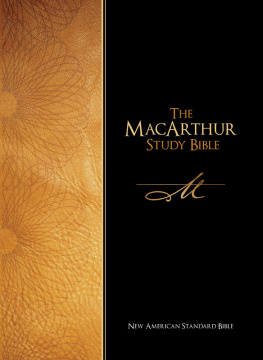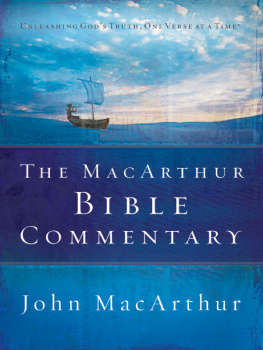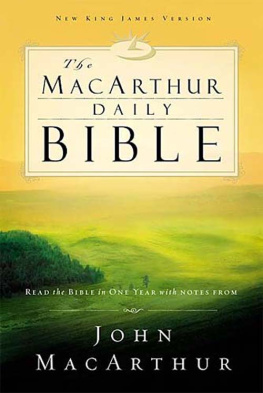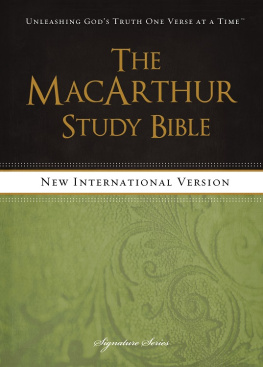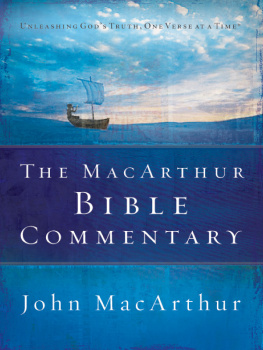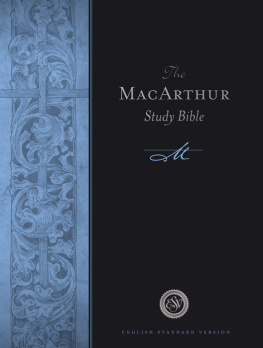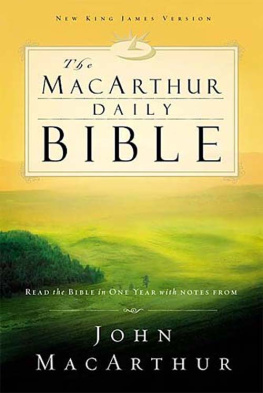
2012, 2014 by John MacArthur
All rights reserved. No portion of this book may be reproduced, stored in a retrieval system, or transmitted in any form or by any meanselectronic, mechanical, photocopy, recording, scanning, or otherexcept for brief quotations in critical reviews or articles, without the prior written permission of the publisher.
Published in Nashville, Tennessee, by Nelson Books, an imprint of Thomas Nelson. Nelson Books and Thomas Nelson are registered trademarks of HarperCollins Christian Publishing, Inc.
Thomas Nelson, Inc., titles may be purchased in bulk for educational, business, fund-raising, or sales promotional use. For information, please e-mail SpecialMarkets@ThomasNelson.com.
Unleashing Gods Truth, One Verse at a Time is a trademark of Grace to You. All rights reserved.
Unless otherwise noted, Scripture quotations are taken from THE NEW KING JAMES VERSION. 1982 by Thomas Nelson, Inc. Used by permission. All rights reserved.
Scripture quotations marked NASB are from NEW AMERICAN STANDARD BIBLE, The Lockman Foundation 1960, 1962, 1963, 1968, 1971, 1972, 1973, 1975, 1977, 1995. Used by permission.
ISBN 978-1-4002-7484-0 (IE)
ISBN 978-1-4002-0611-7 (TP)
ISBN 978-1-4002-0612-4 (eBook)
The Library of Congress has cataloged the hardcover edition as follows:
MacArthur, John, 1939
Twelve unlikely heroes : how God commissioned unexpected people in the Bible and what he wants to do with you / by John MacArthur.
p. cm.
Includes bibliographical references.
ISBN 978-1-4002-0208-9
1. Heroes in the Bible. 2. Bible--Biography. I. Title.
BS579.H4M33 2012
220.92--dc23
2012015176
14 15 16 17 18 RRD 6 5 4 3 2 1
DEDICATION

To my grandsons:
John Matthew
Ty Weston
Andrew Fullerton
Calvin Thomas
Oliver LeGrand
May God find in you faith and faithfulness so that He may add your name to the list of His unlikely heroes.
CONTENTS


T HE WORD HERO IS SLOWLY LOSING its significance because it has been so broadly redefined in popular culture. Artificial heroes and imaginary heroes often overshadow real heroes. Some illusory ideas of heroism have found a home in pop culture. For example, a six-year-old is a hero if he pushes the ball past the fallen goalie in a soccer match so that his flock of ball chasers wins the game. A ten-year-old is a hero worthy of a bumper sticker if she is dubbed student of the week in her classeven if only because she was the one who gave the teacher the least grief. We even have grown-up versions of those same heroes in sports and entertainment.
Nowadays, celebrity status alone is enough to get a person deemed heroic. Youll often hear people refer to their favorite person as my hero, indicating that all that may be necessary to be a hero is to have one person who thinks you are. There is even a mega-hit pop song in honor of someones personal hero: Wind Beneath My Wings. The song asks, Did you ever know that youre my hero? Why? Because You were content to let me shine, thats your way. You always walked a step behind. So I was the one with all the glory!
What? You are my hero because you gave me all the glory?
As bad as pop cultures relentless sentimentalizing and overuse (and thus cheapening) of the word hero is, our ideas of heroism are even more tarnished by our cultures ridiculous obsession with imaginary superheroes, whose fantasy exploits fill everything from comics and cartoons to television and movies. If the artificial heroes we invent in the name of self-esteem or celebrity lower the bar too far, then the imaginary heroes that exist only in fantasy worlds raise it too high. One approach trivializes heroism; the other mythologizes it.
Of course, there are true heroes in real life and always have been, but they do not gain that honor by scoring points in an artificial game meant to elevate their own egos. Nor do they earn it by manifesting the powers of an imaginary superhero. Real heroes are people whose efforts and sacrifices save lives, alter destinies, change history, or shift the course of history for the better.
They appear in vital roles of leadershipin war, medicine, science, law enforcement, civil service, education, or countless other everyday roles. They advance others well-being in some significant way. Even people who dont know them and have no direct personal connection to them recognize their contributions. The world changes for the better because of them.
But even though they are true heroes, most of them make life better only in this world. Not beyond. The greatest heroes are those who are the human means God uses to change people foreverfor their good and His glory. And these true heroes who make an eternal impact are invariably the most unexpected and ordinary peopleGod makes unlikely heroes.
Listen to what Paul wrote in 1 Corinthians 1:2627:
For you see your calling, brethren, that not many wise according to the flesh, not many mighty, not many noble, are called. But God has chosen the foolish things of the world to put to shame the wise, and God has chosen the weak things of the world to put to shame the things which are mighty.
In other words, God works through people whom the world regards as weak, foolish, and unqualified. They are not self-reliant or self-sufficient. Instead, they are those unlikely believers who, when given unique opportunities for eternal impact, depend wholly on Him. As a result, His power and wisdom are put on display, overwhelming the shallow pretenses of worldly heroism.
THE MARKS OF A TRUE HERO
The pages of Scripture are filled with stories of great heroesmen and women whom God used in unique and powerful ways to accomplish His purposes. Their exploits vary greatly, yet the common thread that runs through all of their testimonies is faith.
Even though the word hero does not occur in the New Testament, believers often refer to the biblical saints (such as those listed in Hebrews 11) as the heroes of the faith. They are regarded as heroes for two primary reasons: they believed in the Lord, not just for salvation but for every aspect of life; and they acted on that faith, choosing to honor Him even when it was difficult to do so. When their circumstances seemed impossible, they depended on Gods wisdom and strength rather than their own. And they kept their eyes on Him, choosing to trust in His promises rather than pursue the passing pleasures of sin.
Thus, they were known both for their faith and their faithfulnessand God was honored through them. From the worlds perspective, most of them were not especially noble, strong, or wise. They had quirks, flaws, and shortcomings. But through the power of God, they were used in mighty ways to accomplish His purposes and bring Him glory.
We have much to learn from the legacy left to us by the heroes of the faith. They are the great cloud of witnesses (Hebrews 12:1) that has gone before us. As we study their lives, their testimonies encourage us to respond to trials with steadfast faith and to fight against temptation with uncompromising faithfulness. Their circumstances were often far different from our own, and yet the God-centered principles and priorities that governed their lives are applicable to us as well.
Next page
